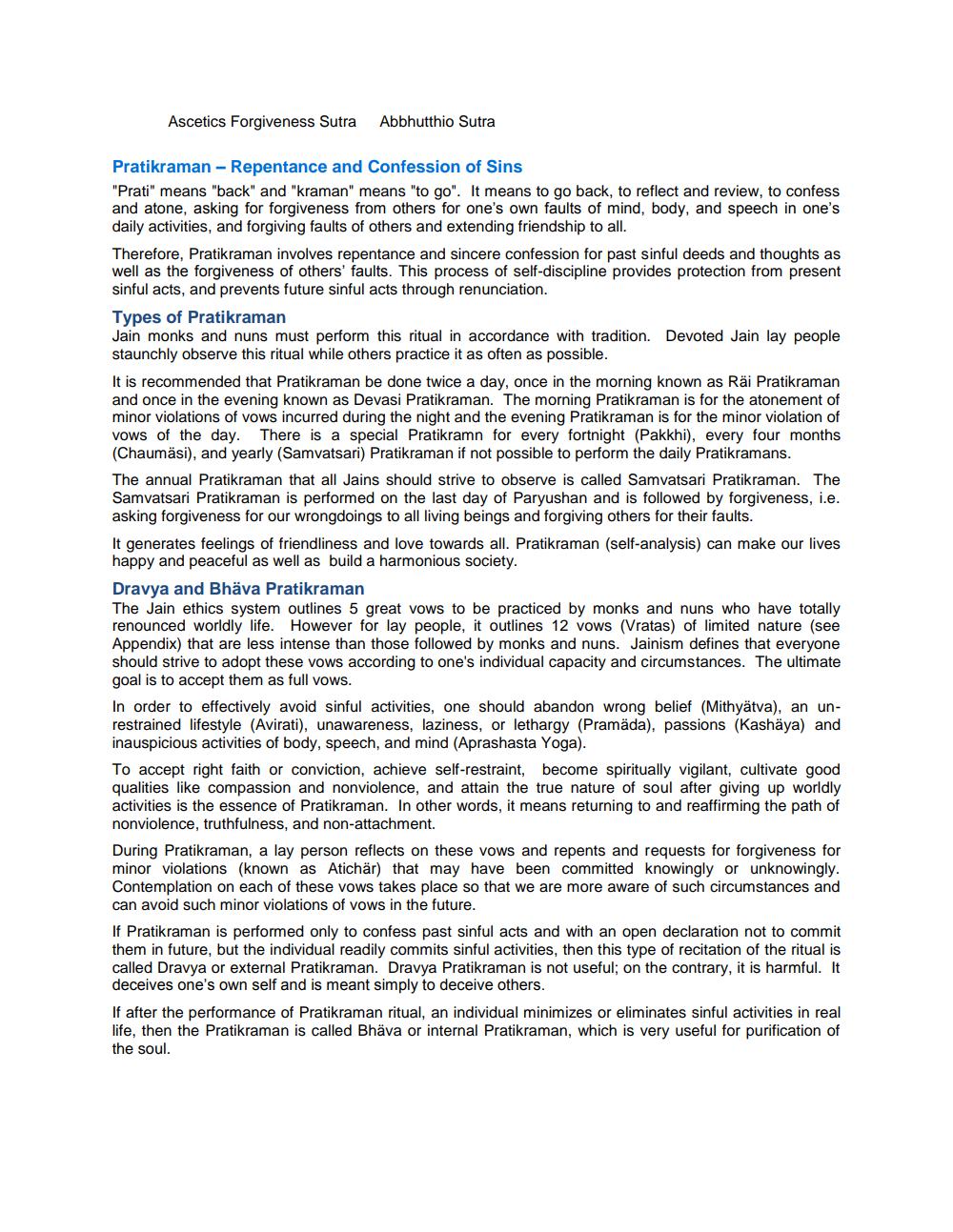Book Title: Pratikraman Observance of Self Reflection Author(s): Pravin K Shah Publisher: JAINA Education Committee View full book textPage 4
________________ Ascetics Forgiveness Sutra Abbhutthio Sutra Pratikraman - Repentance and Confession of Sins "Prati" means "back" and "kraman" means "to go". It means to go back, to reflect and review, to confess and atone, asking for forgiveness from others for one's own faults of mind, body, and speech in one's daily activities, and forgiving faults of others and extending friendship to all. Therefore, Pratikraman involves repentance and sincere confession for past sinful deeds and thoughts as well as the forgiveness of others' faults. This process of self-discipline provides protection from present sinful acts, and prevents future sinful acts through renunciation. Types of Pratikraman Jain monks and nuns must perform this ritual in accordance with tradition. Devoted Jain lay people staunchly observe this ritual while others practice it as often as possible It is recommended that Pratikraman be done twice a day, once in the morning known as Räi Pratikraman and once in the evening known as Devasi Pratikraman. The morning Pratikraman is for the atonement of minor violations of vows incurred during the night and the evening Pratikraman is for the minor violation of Vows of the day. There is a special Pratikramn for every fortnight (Pakkhi), every four months (Chaumäsi), and yearly (Samvatsari) Pratikraman if not possible to perform the daily Pratikramans. The annual Pratikraman that all Jains should strive to observe is called Samvatsari Pratikraman. The Samvatsari Pratikraman is performed on the last day of Paryushan and is followed by forgiveness, i.e. asking forgiveness for our wrongdoings to all living beings and forgiving others for their faults. It generates feelings of friendliness and love towards all. Pratikraman (self-analysis) can make our lives happy and peaceful as well as build a harmonious society. Dravya and Bhäva Pratikraman The Jain ethics system outlines 5 great vows to be practiced by monks and nuns who have totally renounced worldly life. However for lay people, it outlines 12 vows (Vratas) of limited nature (see Appendix) that are less intense than those followed by monks and nuns. Jainism defines that everyone should strive to adopt these vows according to one's individual capacity and circumstances. The ultimate goal is to accept them as full vows. In order to effectively avoid sinful activities, one should abandon wrong belief (Mithyätva), an unrestrained lifestyle (Avirati), unawareness, laziness, or lethargy (Pramäda), passions (Kashäya) and inauspicious activities of body, speech, and mind (Aprashasta Yoga). To accept right faith or conviction, achieve self-restraint, become spiritually vigilant, cultivate good qualities like compassion and nonviolence, and attain the true nature of soul after giving up worldly activities is the essence of Pratikraman. In other words, it means returning to and reaffirming the path of nonviolence, truthfulness, and non-attachment. During Pratikraman, a lay person reflects on these vows and repents and requests for forgiveness for minor violations (known as Atichär) that may have been committed knowingly or unknowingly. Contemplation on each of these vows takes place so that we are more aware of such circumstances and can avoid such minor violations of vows in the future. If Pratikraman is performed only to confess past sinful acts and with an open declaration not to commit them in future, but the individual readily commits sinful activities, then this type of recitation of the ritual is called Dravya or external Pratikraman. Dravya Pratikraman is not useful; on the contrary, it is harmful. It deceives one's own self and is meant simply to deceive others. If after the performance of Pratikraman ritual, an individual minimizes or eliminates sinful activities in real life, then the Pratikraman is called Bhäva or internal Pratikraman, which is very useful for purification of the soul.Page Navigation
1 2 3 4 5 6
